|
|
|
|
|
|
|
|
No Arctic science events are scheduled for today.
|
Media
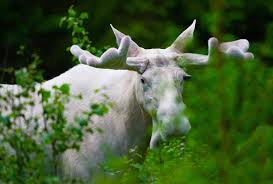 Footage of Rare White Moose Taking a Dip Makes a Big Splash. Footage of Rare White Moose Taking a Dip Makes a Big Splash. This footage is definitely amooseing. A man hiking in Sweden on Friday night captured the above video of a rare white moose, fulfilling a lifelong dream. Hans Nilsson Nilsson was hiking in Varmland County when he came across the creature walking through a creek, according to Storyful.com. Luckily, Nilsson had his camera. A white moose (called an elk in Europe) is very rare: Fewer than 100 are known to live in the area, according to the BBC. Regardless of what you call it, this majestic animal is definitely beautiful. Huffington Post
World's Largest Data Center to be Built in Arctic Circle. A small town in the remote north of the Arctic Circle is set to be home to the world's largest data center. The Kolos facility is being developed by a US-Norwegian partnership, also called Kolos, who say the site will eventually draw on a record-setting 1000 megawatts of power. On their website, Kolos claim Ballangen's cold climate and access to hydropower will help trim energy costs by as much as 60 percent. CNBC
Scientists Launch 6,200-mile Journey Through the Arctic to Uncover the Effects of Global Warming. The email arrived in mid-June, seeking to explode any notion that global warming might turn our Arctic expedition into a summer cruise. 'The most important piece of clothing to pack is good, sturdy and warm boots. There is going to be snow and ice on the deck of the icebreaker,' it read. The Associated Press was joining international researchers on a month-long, 10,000 kilometer (6,200-mile) journey to document the impact of climate change on the forbidding ice and frigid waters of the Far North. Daily Mail
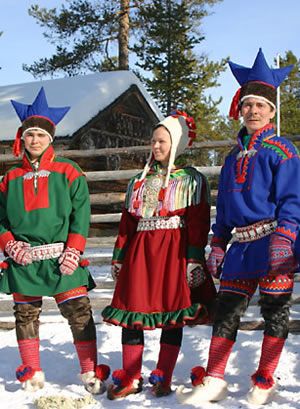 Introducing a Saami-Centered Solution to Substance Abuse. Introducing a Saami-Centered Solution to Substance Abuse. Sleeping in a winter snow cave or picking berries in the fall aren't typically part of mental health and substance abuse recovery programs. But for the Saami in northern Norway, whose culture is deeply tied to the land and sea of the Arctic outdoors, such approaches continue to show signs of success. The Saami Norwegian National Advisory Unit on Mental Health and Substance Use, or SANKS as it is better known, was born in an effort to help members of the Saami community, who, like other Indigenous peoples across the Arctic, take their lives in disproportionate numbers. In northern Norway, the rate of suicides in the Indigenous Saami community across a 28-year period was 50 percent higher than that seen in Norwegians. Earlier studies had already revealed that each Indigenous Arctic population has its unique problems: Certain subgroups of the Saami - male reindeer herders, for example - are at greater risk of depression and alcoholism than their Saami peers. News Deeply
Underwater Permafrost on the Arctic Shelf Melting Faster Than Expected. Russian and Swedish researchers have published a research survey showing that the underwater permafrost layer on the Eastern Siberian continental shelf is melting faster than expected, the press service of the Tomsk Polytechnic University told. "In 1982-1983, the Permafrost Research Institute of the Siberian Branch of the Russian Academy of Sciences drilled four wells, and based on this data we found that the rate of vertical underwater permafrost degradation in the area has gone up to 18 centimeters per year (14 centimeters on average) in the past 30 years, which is ten times faster than expected," the press service said. The Arctic
More Than 800,000 Reindeer Vaccinated Against Anthrax. The authorities responded with resolve when a serious outbreak of anthrax shook the far northern Yamal-Nenets Autonomous Okrug in summer 2016. A mass evacuation of reindeer herders, including children, quickly started from the exposed areas and the country's Ministry of Defense launched a special emergency task force equipped with 30 tons of biologically active agents aimed at decontamination of infected areas. At the same time, a mass vaccination program was launched. That program is continuing this summer. The Barents Observer
|
|
Future Events
** New this week ** Alaska Region Climate Outlook Briefing, August 18, 2017 (Fairbanks, Alaska USA Webinar). This event is part of the OneNOAA Science Seminar Series and is sponsored by the Alaska Center for Climate Assessment and Policy. This webinar will review recent conditions and current state of the climate system in and near Alaska and the status of important global climate drivers, review guidance available for the monthly and seasonal scale outlooks and finish up with the official outlooks by NOAA's Climate Prediction Center. Rick will also present a "Feature-of-the-Month" special addition in which each month he will highlight a topic relevant to the particular month. https://accap.uaf.edu/NWS_Briefings
VII International Conference on Cryopedology, August 21-25, 2017 (Yakutsk, Russia). The conference will be hosted by the Institute for Biological Problems of the Cryolithozone of the Siberian Branch of the Russian Academy of Sciences (SB RAS). Plenary reports will be organized in the hall of the Academy of Sciences of the Sakha (Yakutia) Republic. The official languages of the conference are English and Russian (with translation). All technical facilities (projectors, computers, video sets) will be available during the conference for presentation of papers. Additional information will be available soon. See the Facebook page here.
IARPC Public Webinar Series: The Fulbright Arctic Initiative (August 25, 2017 1pm EDT) The Fulbright Arctic Initiative during the U.S. chairmanship of the Arctic Council (2015-2017) brought together 16 scholars from across the Arctic region. Using a collaborative model to translate theory into practice, the scholars collectively addressed public policy research questions relevant to the Arctic nations' shared challenges in energy, water, health and infrastructure. The co-lead scholars and some of the individual scholars will reflect on their experiences and the impacts of this unique and innovative variation on the Fulbright model. More information at www.iarpccollaborations.org/webinars
 2017 University of the Arctic Rectors' Forum and Conference, August 27-29, 2017 (Aberdeen, Scotland). This conference will also consider how northern scholarship can add to discussions on the North into broader terrains of intellectual engagement. In so doing, it will challenge dominant paradigms of research in both the natural and the social sciences, above all by calling into question the very separation of the world of nature from that of human society which underwrites the distinction between these two branches of scientific inquiry. In its place the conference will seek to forge a new practice of interdisciplinary research, done in collaboration with northern residents and on their terms, which recognizes that every discipline is itself an ongoing conversation, or a way of knowing, rather than a compartment within an overarching, hierarchically organized system of knowledge. Conversations from the North will, then, help to generate a science that is more open-ended, responsive to environmental variation and respectful of the wisdom of inhabitants. 2017 University of the Arctic Rectors' Forum and Conference, August 27-29, 2017 (Aberdeen, Scotland). This conference will also consider how northern scholarship can add to discussions on the North into broader terrains of intellectual engagement. In so doing, it will challenge dominant paradigms of research in both the natural and the social sciences, above all by calling into question the very separation of the world of nature from that of human society which underwrites the distinction between these two branches of scientific inquiry. In its place the conference will seek to forge a new practice of interdisciplinary research, done in collaboration with northern residents and on their terms, which recognizes that every discipline is itself an ongoing conversation, or a way of knowing, rather than a compartment within an overarching, hierarchically organized system of knowledge. Conversations from the North will, then, help to generate a science that is more open-ended, responsive to environmental variation and respectful of the wisdom of inhabitants.
- Small and off-grid community energy solutions
- Oil and gas development
- Renewable energy
- Regulation and Financing
- Transportation and transmission
The AES is a multi-disciplinary event expected to draw several hundred industry officials, scientists, academics, policy makers, energy professionals and community leaders together to collaborate and share leading approaches on Arctic energy issues.
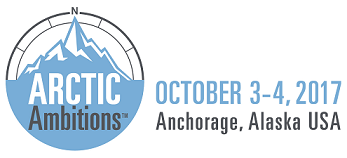 Arctic Ambitions VI: International Business Conference & Trade Show, October 3-4, 2017 (Anchorage, Alaska USA). Arctic Ambitions VI: International Business Conference & Trade Show, October 3-4, 2017 (Anchorage, Alaska USA). For the 6th year in a row, World Trade Center Anchorage will host the Arctic Ambitions Conference - an event focused on trade, commerce, and investment in the region. This year, the theme of the conference is New Arctic Realities: The Path Forward. With this theme, the following areas will be highlighted: transportation, technology and innovation, infrastructure development, natural resource exploration and production, international trade opportunities, finance and investment, pan-Arctic commerce, and the new political climate toward Arctic development under the Trump Administration.
5th Northern Oil and Gas Research Form, October 11-13, 2017 (Anchorage, Alaska USA). The United States is hosting the 5th Northern Oil and Gas Research Forum from October 11-13, 2017, in Anchorage, Alaska. This meeting will feature current research and highlight information needs for management of petroleum activities in the US and Canadian Arctic. Abstracts for poster presentations on research and how research is used in management actions are presently being solicited. Please visit the Forum's website (here) for additional details. Deadline for abstract submission is September 10. There is no registration fee for the Forum. Please use the website link above for information on registration, agenda, lodging and transportation.
2017 Arctic Circle Assembly, October 13-15, 2017 (Reykjavik, Iceland). The annual Arctic Circle Assembly is the largest annual international gathering on the Arctic, attended by more than 2000 participants from 50 countries. The Assembly is held every October at the Harpa Conference Center and Concert Hall and is attended by heads of states and governments, ministers, members of parliaments, officials, experts, scientists, entrepreneurs, business leaders, indigenous representatives, environmentalists, students, activists and others from the growing international community of partners and participants interested in the future of the Arctic.
5th Alaska Native Health Research Conference, October 16-18, 2017 (Anchorage, Alaska USA). This conference provides a forum to share current health research occurring in Alaska with Alaska Native people. The theme of the conference is "Strengthening Communities through Research for a Healthier Tomorrow". Health topics to be discussed include aging, suicide, health risks associated with added sugar in the diet, infectious disease, and cancer. The conference aims to engage attendees in a fruitful dialogue on the research currently happening in communities, and how to improve research so that it is respectful of and reflects the needs of the Alaska Native people and their communities. We will also identify the areas where research is not being conducted and discuss ways to address these research gaps. This event is sponsored by The Alaska Native Tribal Health Consortium (ANTHC) Health Research Review Committee.
 Polar Law Symposium 2017 and Rovaniemi Arctic Spirit, November 13-16, 2017 (Rovaniemi, Finland). The purpose of the Polar Law Symposium is to examine, in detail, the implications of the challenges faced by the Polar Regions for international law and policy and to make recommendations on appropriate actions by states, policy makers and other international actors to respond to these emerging and re-emerging challenges. The Rovaniemi Arctic Spirit Conference is integrated with the Polar Law Symposium, which will be organized by the Northern Institute for Environmental and Minority Law at the Arctic Center of the University of Lapland. Polar Law Symposium 2017 and Rovaniemi Arctic Spirit, November 13-16, 2017 (Rovaniemi, Finland). The purpose of the Polar Law Symposium is to examine, in detail, the implications of the challenges faced by the Polar Regions for international law and policy and to make recommendations on appropriate actions by states, policy makers and other international actors to respond to these emerging and re-emerging challenges. The Rovaniemi Arctic Spirit Conference is integrated with the Polar Law Symposium, which will be organized by the Northern Institute for Environmental and Minority Law at the Arctic Center of the University of Lapland.
ArcticNet invites the global Arctic research community to Arctic Change 2017! This conference will bring together Arctic researchers and students with Inuit, Northerners and government, industry and NGO stakeholders. The world's foremost Arctic scientists will present research findings and discuss impacts of climate change and modernization. With 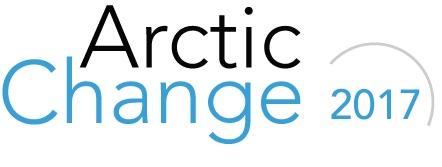 over 1500 participants expected, Arctic Change 2017 will be one of the largest trans-sectoral international Arctic research conferences held in Canada. We welcome students and early career researchers to participate in "Student Day" at the start of the Conference. See an excerpt from last year: ArcticNet ASM2016. over 1500 participants expected, Arctic Change 2017 will be one of the largest trans-sectoral international Arctic research conferences held in Canada. We welcome students and early career researchers to participate in "Student Day" at the start of the Conference. See an excerpt from last year: ArcticNet ASM2016.
ISAR-5 Fifth International Symposium on Arctic Research, January 15-18, 2018 (Tokyo, Japan). The fifth ISAR has been planned at the recommendation of the science steering committee of ISAR-4, which was held in Toyama, Japan in April 2015. The fifth ISAR will be devoted to discussions on environmental changes in the Arctic and their regional and global implications, to seek additional international scientific collaboration in this area by gathering, synthesizing and sharing information related to these changes occurring in the Arctic. Special emphasis will be placed on the fields of the social sciences and humanities, which were not included in the previous ISARs. ISAR-5 will consist of general sessions and special sessions. The general sessions will address the following topics: atmosphere; ocean and sea ice; rivers, lakes, permafrost, and snow cover; ice sheets, glaciers, and ice cores; terrestrial ecosystems; marine ecosystems; geospace; policies and economy; and social and cultural dimensions. Special sessions will be solicited on cross-cutting themes.
The Effects of Climate Change on the World's Oceans, June 4-8, 2018 (Washington, DC USA).
The 4th International Symposium will bring together experts from around the world to better understand climate impacts on ocean ecosystems - and how to respond. The event is hosted by a variety of groups including International Council for the Exploration of the Sea (ICES), North Pacific Marine Science Organization (PICES), Intergovernmental Oceanographic Commission of UNESCO (IOC), and Food and Agriculture Organization of the United Nations (FAO).
 POLAR 2018, June 15-27, 2018 (Davos, Switzerland).POLAR2018 is a joint event from the Scientific Committee on Antarctic Research (SCAR) and the International Arctic Science Committee (IASC). The SCAR meetings, the ASSW and the Open Science Conference will be hosted by the Swiss Federal Institute for Forest, Snow and Landscape Research WSL under the patronage of the Swiss Committee on Polar and High Altitude Research. The WSL Institute for Snow and Avalanche Research SLF is organizing POLAR2018. POLAR 2018, June 15-27, 2018 (Davos, Switzerland).POLAR2018 is a joint event from the Scientific Committee on Antarctic Research (SCAR) and the International Arctic Science Committee (IASC). The SCAR meetings, the ASSW and the Open Science Conference will be hosted by the Swiss Federal Institute for Forest, Snow and Landscape Research WSL under the patronage of the Swiss Committee on Polar and High Altitude Research. The WSL Institute for Snow and Avalanche Research SLF is organizing POLAR2018.
17th International Congress of Circumpolar Health (ICCH17), August 12-15, 2018 (Copenhagen, Denmark). The ICCH congresses are held every third year in different locations in the circumpolar area and represent the largest scientific meetings worldwide on circumpolar health. The ICCH congresses serve as the primary source of information exchange and scholarly communication in issues relating to circumpolar health. More than 750 participants generally register and participate in each Congress, and more than 400 scientific papers or posters are usually presented.
Arctic Biodiversity Congress, October 9-11, 2018 (Rovaniemi, Finland). The second Arctic Biodiversity Congress is hosted by the Conservation of Arctic Flora and Fauna (CAFF), the biodiversity working group of the Arctic Council, and the Ministry of the Environment, Finland. The second Arctic Biodiversity Congress will build on the success of the first Congress, held in 2014 in Trondheim, Norway, and will bring together scientists, policymakers government officials, Indigenous representatives, Traditional Knowledge holders, industry, non-governmental organizations, and others to promote the conservation and sustainable use of Arctic biodiversity.
|
|

  
4350 N. Fairfax Drive, Suite 510
Arlington, VA 22203, USA
External links in this publication, and on the USARC's World Wide Web site ( www.arctic.gov) do not constitute endorsement by the US Arctic Research Commission of external Web sites or the information, products or services contained therein. For other than authorized activities, the USARC does not exercise any editorial control over the information you may find at these locations. These links are provided consistent with the stated purpose of this newsletter and the USARC Web site.
|
|
|
|
|
|
|
|
|

 Footage of Rare White Moose Taking a Dip Makes a Big Splash. This footage is definitely amooseing. A man hiking in Sweden on Friday night captured the above video of a rare white moose, fulfilling a lifelong dream. Hans Nilsson Nilsson was hiking in Varmland County when he came across the creature walking through a creek, according to
Footage of Rare White Moose Taking a Dip Makes a Big Splash. This footage is definitely amooseing. A man hiking in Sweden on Friday night captured the above video of a rare white moose, fulfilling a lifelong dream. Hans Nilsson Nilsson was hiking in Varmland County when he came across the creature walking through a creek, according to  Introducing a Saami-Centered Solution to Substance Abuse. Sleeping in a winter snow cave or picking berries in the fall aren't typically part of mental health and substance abuse recovery programs. But for the Saami in northern Norway, whose culture is deeply tied to the land and sea of the Arctic outdoors, such approaches continue to show signs of success. The Saami Norwegian National Advisory Unit on Mental Health and Substance Use, or SANKS as it is better known, was born in an effort to help members of the Saami community, who, like other Indigenous peoples across the Arctic, take their lives in disproportionate numbers. In northern Norway, the rate of suicides in the Indigenous Saami community across a 28-year period was 50 percent higher than that seen in Norwegians. Earlier studies had already revealed that each Indigenous Arctic population has its unique problems: Certain subgroups of the Saami - male reindeer herders, for example - are at greater risk of depression and alcoholism than their Saami peers.
Introducing a Saami-Centered Solution to Substance Abuse. Sleeping in a winter snow cave or picking berries in the fall aren't typically part of mental health and substance abuse recovery programs. But for the Saami in northern Norway, whose culture is deeply tied to the land and sea of the Arctic outdoors, such approaches continue to show signs of success. The Saami Norwegian National Advisory Unit on Mental Health and Substance Use, or SANKS as it is better known, was born in an effort to help members of the Saami community, who, like other Indigenous peoples across the Arctic, take their lives in disproportionate numbers. In northern Norway, the rate of suicides in the Indigenous Saami community across a 28-year period was 50 percent higher than that seen in Norwegians. Earlier studies had already revealed that each Indigenous Arctic population has its unique problems: Certain subgroups of the Saami - male reindeer herders, for example - are at greater risk of depression and alcoholism than their Saami peers. 
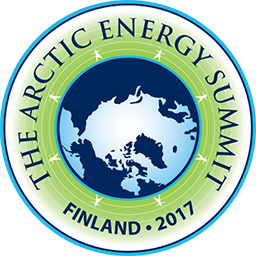


 over 1500 participants expected, Arctic Change 2017 will be one of the largest trans-sectoral international Arctic research conferences held in Canada. We welcome students and early career researchers to participate in "Student Day" at the start of the Conference. See an excerpt from last year:
over 1500 participants expected, Arctic Change 2017 will be one of the largest trans-sectoral international Arctic research conferences held in Canada. We welcome students and early career researchers to participate in "Student Day" at the start of the Conference. See an excerpt from last year: 


